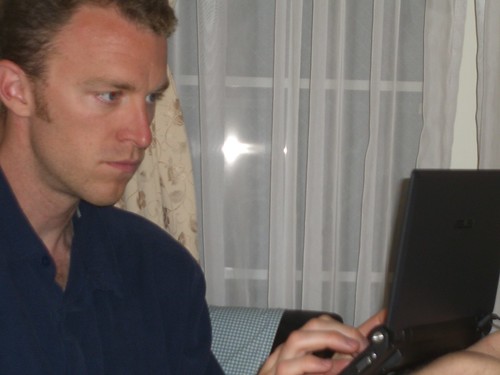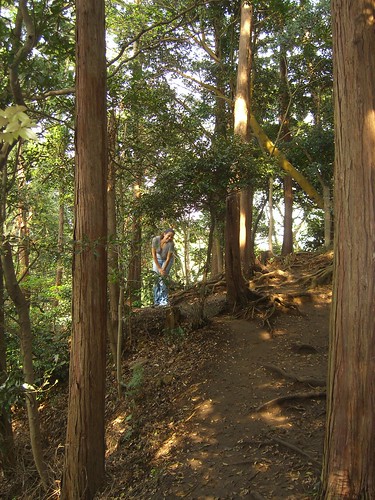
After Nikko we're back in Tokyo. Only
briefly this time, for a change of trains to get to Kamakura. But
the station is unmistakeable in its Tokyo-ness.
Again the crowds are dominated by the
conservative grays of salarymen and the urban chic. The station is
packed, a mass of moving people with an undistractable manner, their
vision set and their blinders on.
But I also notice how different Tokyo
seems.

When we first arrived here, just under 3 weeks ago, this same
station was an overwhelming barrage on the senses. The noise; of
people talking, the collective roar of tens of thousands of shoes
stomping in the focused gait of the up-and-coming, the chiming and
incomprehensible voice prompts from ticket machines and PA systems
announcing arrivals, departures, doors opening, doors closing. Our
vista equally chaotic; so many bright lights and signs and boldly
colored kiosks and vending machines, advertising posters with
unreadable symbols and strange products, and always, everywhere the
massive press of people moving around you like a raging river
swirling around a tree, seemingly threatening to pull it out and
sweep it along. The sense I had was very much like the first time
walking into a Vegas casino.
But this time, it was different. As if
we had adjusted the aperture of our minds, the blinding brilliance of
the scene was toned down, the roar muted. In the midst of the chaos
I felt safely aloof to it. With our new focus we could find our
signs, find our way, and trod our route with sure steps, no longer
like lost children. This is good in that excitement and attention
are both finite resources, and there is no way we could survive 8
months of travel with the same level of exuberance as our first day.
But I also mourn a little for the loss of that wide-eyed child. I
travel to awaken this childlike wonder, which goes dormant at home,
lulled by the familiar routines. If it is already lessening then I
can only hope that a move from Japan to China will bring new newness,
and bedazzlement again.
We got into Kamakura in mid-afternoon,
but just crashed. We've been setting a pretty fast pace for the past
three weeks and even our one rest day in Nikko didn't really recharge
the batteries. Susan's sushi radar served us well, but this was
really just a break between nap and sleep.
The next morning we were both much
refreshed. Out hotel is a really cute little place built in the
western style around 1920 something. As we were checking out the
proprietor asked how we had slept and something else we didn't
understand. Not wanting to insult his English, I smiled and
commented on the “character and charm” and said I liked his hotel
very much. This was clearly the desired response to his query,
whatever it was, and we went off for the day with a big bow and a big
smile.

Kamakura's claim to fame is... (wait
for it) temples. It's an old capital and has tons of the things.
But the biggest draw is the temple that is no longer. A giant Buddha
statue (second only to the one in Nara) sits out in the air as he has
for the centuries since his stupa was destroyed in a typhoon. The
effect is very cool, as this HUGE Buddha is just sitting out in the
middle of the woods.

You can also go inside of the statue, which was
really interesting to see since I was still puzzling over some of the
details of how they constructed this behemoth. It's the weekend
still, and Kamakura's a popular day trip from Tokyo, complete with
excellent pastry shops and $7 cups of coffee. As dead as the streets
were the night before when we went for dinner, they we're packed
today, and we were weaving around families of all sizes as we all
tromped from site to site.


From the Daibatsu (Giant Buddha) we
walked a short distance to this really cool temple. Rather than go
for quantity we decided to spend quality time at this one. The
temple grounds meander up the side of a hill, and broke up our
walking around it by perching on a bench in the garden for awhile,
taking in the garden, the people and the view of the beach (and
surfers!). We lunched at their soba shop, which along with it's
awesome view provided the opportunity to order from a vending
machine. These are all over here, but this is the first time we'd
had occasion to use one. You pay at the machine and punch your menu
selection, then get a little ticket and find a seat. Fortunately
vending machine ordering isn't like converyor belt sushi and the
vegetarian fare (this is a Buddhist temple) was tasty and fresh.

There's a cool cave here, with various
dieties carved right into the living rock. I had to walk bent
halfway over, but it was pretty nifty.
After the two Buddhas (and Nikko, Nara,
Koya-san, and Kyoto) we were sort of templed out. Instead of taking
the usual route and seeing more temples, we decided to follow the
“hiking trail” and have a walk in the woods.
The route winds along the ridgeline
over the city, and the path starts by climbing an enormous set of
stairs. Well, it didn't need to be quite as enormous as it was.
Wanting to get some photos of Susan, I trotted ahead a bit and took
some shots, not realizing I had trotted right past our turn.

Busy
smiling and catching up, poor, trusting Susan missed it too. When
the path sort of vanished into underbrush we started to think this
might not be the right way. (OK Susan was thinking that, I was
saying “maybe they just haven't mowed for a while, it is
springtime, things grow fast”). Yeah, well halfway back down the
hill we met up with the folks doing the reverse route and got right
again. Heh, heh, sorry Susan.
From here the path was wide and
super-obvious. Actually the turn was super-obvious, what with it's
English language sign shaped like an arrow that says “Daibatsu
Hiking Trail”. D'oh.

We passed loads of folks going the other
way, a motley mix of westerners and Japanese, young and old, hiking
shoes and – heels!? My favorite was the girl in uggs and white
pants that we passed near the end (for her the beginning) who was
really having trouble getting down this one steep without getting all
muddy. She had no idea what lay ahead, and the path was really
muddy. Even in hiking shoes Susan slipped once. But we had no hope
of explaining this to her, and as she was at the bottom of the steep
anyway I figured “in for a penny in for a pound”.
At the end of the route we stopped in
at a little Shinto shrine. The tradition here is that there is a
magical spring and if you wash your money and then spend it, it will
come back to you many times over. Dork that I am I immediately
thought of my old economics professor and the “money factor”. Is
this effective economic stimulus? It was certainly effective for the
many vendors who had set up junk food and tchotchi stalls right
nearby. We resisted the urge to prove the inflationary effect of
excessive discretionary spending and got back to town for our train
to Tokyo, with a quick stop off for a second round of sushi at our
happy find of the night before.
